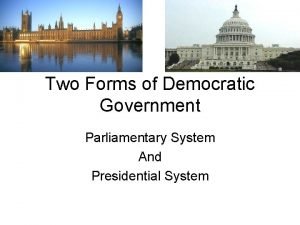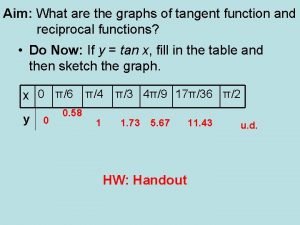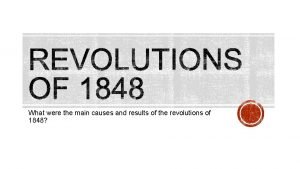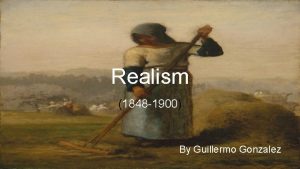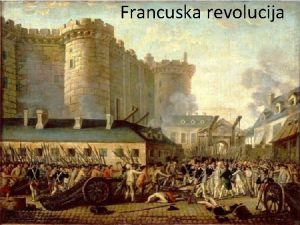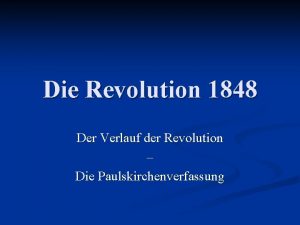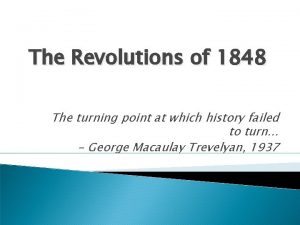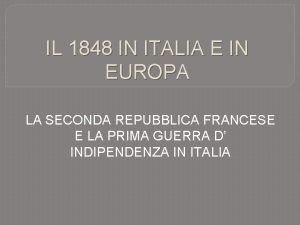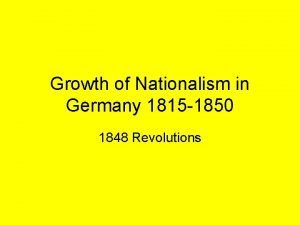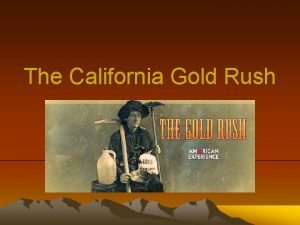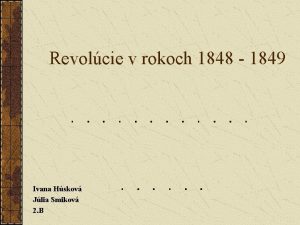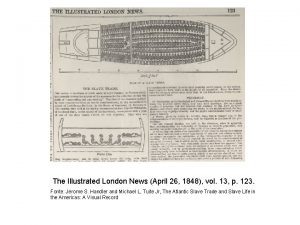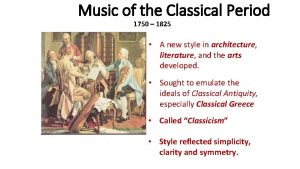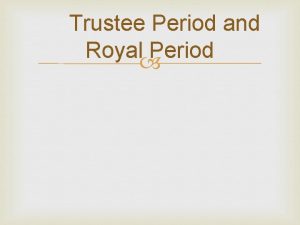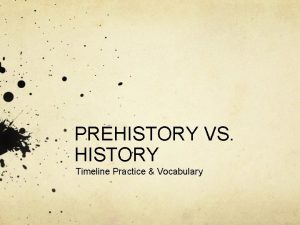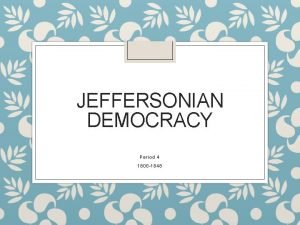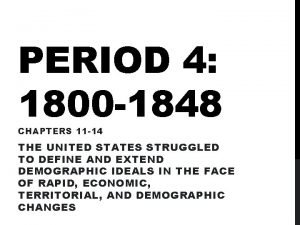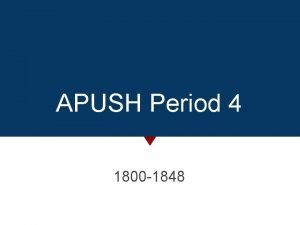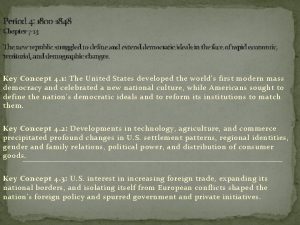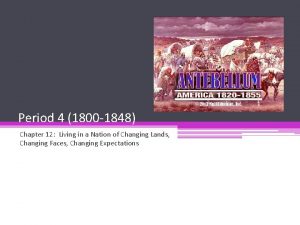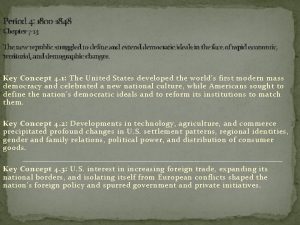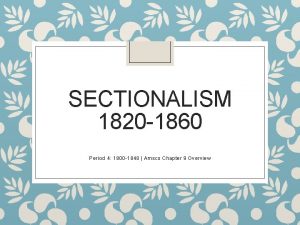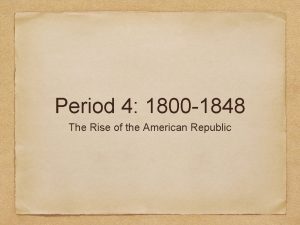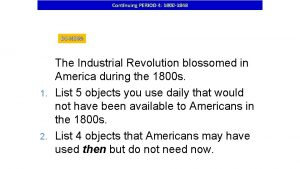Period 4 1800 1848 Finding democracy in the














































- Slides: 46

Period 4: 1800 -1848 Finding democracy in the midst of rapid economic, territorial, and demographic changes

North America--1800

What is worth noting about this map? Predict what changes will occur to this map by the end of Period 4 (1800 -1848)

US Pop. Grew from 3. 9 million to 5. 3 million 1790 -1800 (approx population of CO) Population Density 1800 Predict what will be happening in regards to the following populations: American Indians Black Americans Women Political Elites “common man”

Spanish Colonies Mexico City=200, 000 Peninsulares (high officials) Criollos (native-born) Sparsely settled Santa Fe, San Antonio, etc… Mainly A. I. New Orleans

Haiti and Caribbean Haiti=first independent black nation (1791) Slave revolt 90% of Europe’s sugar Heavy slave labor

British N. America Strong French presence Loyalists, a few American immigrants Fur trade Friendly relationships with A. I.

Russian America Fur trade Established under Peter the Great Good and bad relationships with Inuit and Aleut Rapid growth—off the radar of US

US—Appalachia expansion Kentucky and Tennessee admitted as states Cincinnati= “Queen City of the West”

Jefferson & the Revolution of 1800

Agrarian Republic PROS Population growth Community values Local democracy Domestic food production CONS Persistent mobility Environmental damage Expanded slave labor American Indian human rights violations

Louisiana Purchase France secretly acquired Louisiana Territory from Spain in 1800 Jefferson didn’t want Napoleon in his backyard US lost access to New Orleans

Louisiana Purchase Napoleon wanted to sell in 1803 Why? Monroe & Livingston bought for $15 million Constitutional problem Purchase by executive Admission of foreign nations

Foreign Policy CNN—TJ and ISIS Embargo Act-1807 In response to British treatment of American shipping Forbade American ships from sailing to any foreign port Sanctioned ourselves Was a disaster

James Madison--1808

War of 1812 Points of View British view American Indian View Document Analysis

LEQ Analysis Compare and Contrast the impact of the War of 1812 on the United States, Britain, and American Indians.


Russia Spain Portugal

• In 1807, Napoleon invaded Portugal and Spain. • Portugal and Spain are busy defending themselves in Europe, and their American colonies revolt. • New countries like Mexico, Brazil, and Haiti won their independence. • In 1815, Napoleon is finally defeated in Europe. 1807 1814 War of 1812 Ends Napoleon invades Portugal and Spain 1815 Napoleon is defeated

• In 1821, Russia claims land south of Alaska and forbids other countries from passing into their territory. 1807 1814 War of 1812 Ends Napoleon invades Portugal and Spain 1815 Napoleon is defeated 1821 Russia moves south in Alaska

Russia Spain Portugal

• The United States recognizes the new Latin American countries, such as Mexico, Brazil and Haiti, and begins trading. • Trade is very profitable. • The United States stands to lose a lot of money if Spain and Portugal take back their colonies. 1807 1814 War of 1812 Ends Napoleon invades Portugal and Spain 1815 Napoleon is defeated 1821 Russia moves south in Alaska

• In 1823, President Monroe declares: • The American continent will not be considered as subjects for future colonization by any European power. • In other words, if Europe comes over to interfere with any country in America (including South America), the US will respond with war. 1807 1814 War of 1812 Ends Napoleon invades Portugal and Spain 1815 Napoleon is defeated 1821 1823 Russia moves south in Alaska The Monroe Doctrine is applied

• Portugal – Would like to reclaim Brazil after a long war, and they could, but risk angering the British and America. • America – Russia is invading territory that could be considered American, and Spain and Portugal may ruin trade with new Latin American countries. • Spain – Would like to reclaim Mexico, and France has offered to support this war, but the British have threatened to attack Spain if they attempt to reclaim Mexico.

• Russia – Mainly interested in Fur trading, not colonization, but is seen as a threat by America. Russia has to decide how to respond to Americans violating their new territory. • Great Britain – Worried that Spain and Portugal may challenge them as a world power if they reclaim territory. Also worried about losing out on profitable trade. • Latin America – Asking for help from America and England in remaining independent. Willing to fight Guerrilla Warfare to hold on to independence.

Monroe Doctrine—Key Ideas The Western Hemisphere was no longer open for colonization The political system of the Americas was different from Europe The United States would regard any interference in Western hemispheric affairs as a threat to its security The United States would refrain from participation in European wars and would not disturb existing colonies in the Western Hemisphere

Outcomes Spain Florida (Adams-Onis Treaty— 1819) Boundaries along Louisiana Territory Russia Convention of 1824 Established southern boundary of Russian America. Britain Rush-Bagot— 1817 49 th parallel Joint claims to Oregon Territory Superior navy Maintain hegemonic power in Europe US Got lucky

Monroe Doctrine Significance? Future connections Short term—Texas, California, Oregon Long term--? Wilson Bush

Election of 1824 “Corrupt Bargain”

The Candidates 1. John Quincy Adams 2. Henry Clay 3. John C. Calhoun 4. William H. Crawford 5. Andrew Jackson Objective—create a profile for your assigned candidate including the following 1. 2. 3. 4. 5. 6. Where from Previous political career Political party affiliation Outcome Future political career Random/fun fact

1. John Quincy Adams 1. Massachusetts 2. Secretary of State under Monroe 3. Jeffersonian Republicans 4. Won 5. 4 years in office 6. Random/fun fact

2. Henry Clay 1. 2. 3. 4. 5. Kentucky (represented the West) Senate, House of Rep, Speaker of the House, Warhawk, “American System” Jeffersonian Republican Appointed Secretary of State by Adams— accusation of corrupt bargain “The Great Compromiser” 1. 2. 3. Missouri Compromise Nullification Crisis Compromise of 1850

3. John C. Calhoun 1. South Carolina 2. Warhawk, 3. Political party affiliation 4. w/drew to run for VP 5. Dogmatic supporter of slavery and the south 6. “Cast-Iron Man”

4. William H. Crawford 1. Georgia 2. Cabinet positions 3. Jeffersonian Republican 4. Lost election 5. Served as a judge in Georgia

5. Andrew Jackson 1. Tennessee 2. Lawyer, house, senate, military, judge 3. Formed Democratic party 4. Lost 5. President 1828 -1836 6. A very long list…

Election of 1828 Growth of Democracy

Causation Practice: Groups of 23 Objective: Explain the 1) Martin Van Buren & significance that each of Albany Regency the following events 2) War of 1812 may have had on the 3) Westward expansion election of 1828. 4) Panic of 1819 5) Latin American Revolution 6) Print revolution 7) “common man”

HTS: Causation— Election of 1828 1) Martin Van Buren & Albany Regency 2) War of 1812 3) Westward expansion 4) Panic of 1819 5) Latin American Revolution 6) Print revolution 7) “common man” 1) similar party organization elected Jackson—Van. Buren was campaign manager 2) Battle of New Orleans— expanded voting rights to white males 3) expansion of suffrage in the West—new political affiliation 4) ended era of good feelings 5) increased fears of the South—blocked diplomatic attempts made by H. Clay 6) expanded political info to… 7) “common man”

The Revolution of 1828?



Jackson’s Indian Policy Expansion in the South Surrounded tribes Chicksaw, Cherokee, Choctaw, and Creek Assimilated into white culture via constitution, written language, & slaves Expansion in the North Black Hawk War Sauk and Fox massacred Lieutenant Jefferson Davis & Captain Abraham Lincoln

Trail of Tears Cherokee resided on land granted by treaty Cherokee constitution declared they were not subject to laws of other nations (1827) Georgia declared that they were (1830) Cherokee Nation v. Georgia Worcester v. Georgia Jackson? Regarded “treaties with Indians an absurdity” No protection under law resulted in Trail of Tears

Trail of Tears 1800 mile journey 17, 000 Cherokees 4, 000 died on the way Only 8, 000 survived the march to Oklahoma

Wilkinson—Indian Tribes and the American Constitution http: //www. mlive. com/news/grandrapids/index. ssf/2014/11/policing_authority_fo r_little. html
 Different between parliamentary and presidential
Different between parliamentary and presidential Finding the period of a tangent function
Finding the period of a tangent function Slidetodoc.com
Slidetodoc.com Emancipace žen 1848
Emancipace žen 1848 Realism (1848–1900)
Realism (1848–1900) Democratisering van nederland 1848 tot 1919
Democratisering van nederland 1848 tot 1919 Francuska u 17 st
Francuska u 17 st Revolution 1848 verlauf
Revolution 1848 verlauf Austroslavism
Austroslavism Quadrilatero austriaco
Quadrilatero austriaco Leto 1848 leto revolucij
Leto 1848 leto revolucij 1848-as katonadalok
1848-as katonadalok Why did the italian revolution of 1848 fail
Why did the italian revolution of 1848 fail Revolucija u italiji 1848
Revolucija u italiji 1848 January 24, 1848
January 24, 1848 Deutschlands weg zum nationalstaat
Deutschlands weg zum nationalstaat Leto 1848 in slovenci
Leto 1848 in slovenci 1848 revolution germany
1848 revolution germany Why did the 1848 revolutions fail
Why did the 1848 revolutions fail Bernhard bolzano
Bernhard bolzano Francúzska revolúcia 1848
Francúzska revolúcia 1848 Revolucije u europi 1848
Revolucije u europi 1848 Illustrated london news 1848
Illustrated london news 1848 Leto 1848 in slovenci
Leto 1848 in slovenci Anul 1848 in europa
Anul 1848 in europa Is hyperpolarization the same as refractory period
Is hyperpolarization the same as refractory period Critical period vs sensitive period
Critical period vs sensitive period Stability period vs measurement period
Stability period vs measurement period Critical period vs sensitive period
Critical period vs sensitive period Classical period 1750 to 1820 romantic period
Classical period 1750 to 1820 romantic period Trustee period and royal period
Trustee period and royal period Critical period vs sensitive period
Critical period vs sensitive period Critical period
Critical period Period 4, metallic, 27 electrons
Period 4, metallic, 27 electrons Ad vs bce
Ad vs bce A&p flix activity: generation of an action potential
A&p flix activity: generation of an action potential In this period, youth became completely rebellious.
In this period, youth became completely rebellious. Dạng đột biến một nhiễm là
Dạng đột biến một nhiễm là Nguyên nhân của sự mỏi cơ sinh 8
Nguyên nhân của sự mỏi cơ sinh 8 Vẽ hình chiếu đứng bằng cạnh của vật thể
Vẽ hình chiếu đứng bằng cạnh của vật thể độ dài liên kết
độ dài liên kết Chó sói
Chó sói Thiếu nhi thế giới liên hoan
Thiếu nhi thế giới liên hoan Sự nuôi và dạy con của hươu
Sự nuôi và dạy con của hươu điện thế nghỉ
điện thế nghỉ Một số thể thơ truyền thống
Một số thể thơ truyền thống Trời xanh đây là của chúng ta thể thơ
Trời xanh đây là của chúng ta thể thơ
